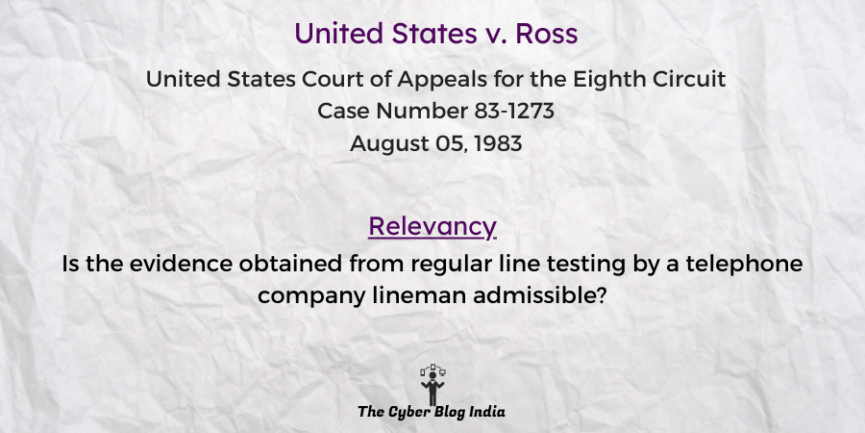United States v. Ross

United States of America v. Larry Dale Ross
713 F.2d 389
In the United States Court of Appeals for the Eighth Circuit
Case Number 83-1273
Before Senior Circuit Judge Henley, Circuit Judge Arnold, and Circuit Judge Gibson
Decided on August 05, 1983
Relevancy of the case: Is the evidence obtained from regular line testing by a telephone company lineman admissible?
Statutes and Provisions Involved
- The Unlawful Acts, 18 U.S.C. §§ 371, 842
- The Omnibus Crime Control and Safe Streets Act, 18 U.S.C. §§ 2510-2520
Relevant Facts of the Case
- The trial court convicted the appellant of conspiring to knowingly transport highly explosive materials in interstate commerce. The prosecution admitted these explosives as evidence at the trial.
- The appellant claimed an error in the seizure of explosives. During the trial, his counsel argued that it resulted from a violation of federal wiretapping law. A telephone lineman overheard his conversation during a line test.
- The lineman intercepted a conversation where Ross discussed hiding explosives in a freezer and instructed someone to load them in a car.
- The trial court held that the lineman did not violate the federal wiretapping laws. His interception was not wilful, and the search warrant was based on a probable cause.
Prominent Arguments by the Counsels
- The appellant’s counsel argued that the lineman’s interception and disclosure of the telephone conversation violated Section 2511. The district court erred in finding that his interception was not wilful.
- The appellant’s counsel argued the district court erred in finding that Gregory’s interception was not wilful, as it occurred in the ordinary course of his employment.
- The respondent’s counsel argued that the “totality of the circumstances” approach supports the validity of the search warrant. Further, the exceptions in Section 2511(2)(a)(i) apply to the lineman’s actions as an employee of a communication carrier.
Opinion of the Bench
- In the ordinary course of his employment, the lineman lawfully intercepted the telephone line to check the noise level.
- Considering the veracity, reliability, and basis of knowledge of the informant, probable cause supported the search warrant.
- The magistrate had a substantial basis to conclude that probable cause existed for issuing the search warrant.
Final Decision
- The court upheld the District Court’s decision and the appellant’s conviction.
Aditi Mangesh Sawant, an undergraduate student at NMIMS Kirit P Mehta School of Law, Mumbai, prepared this case summary during her internship with The Cyber Blog India in January/February 2024.
